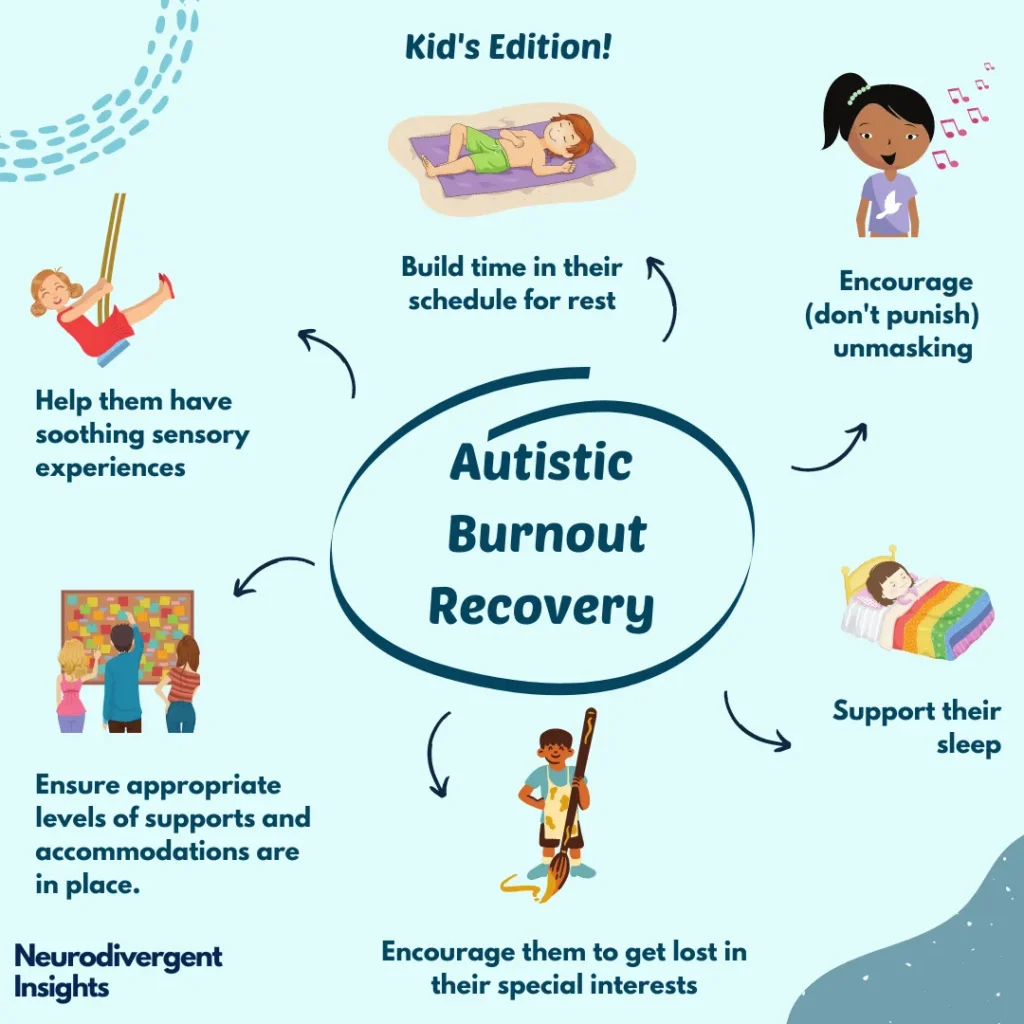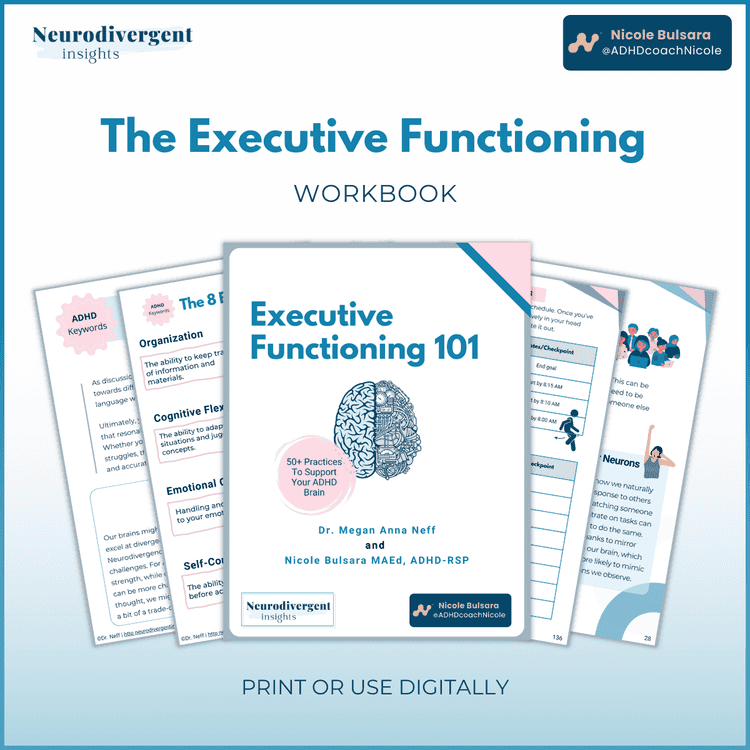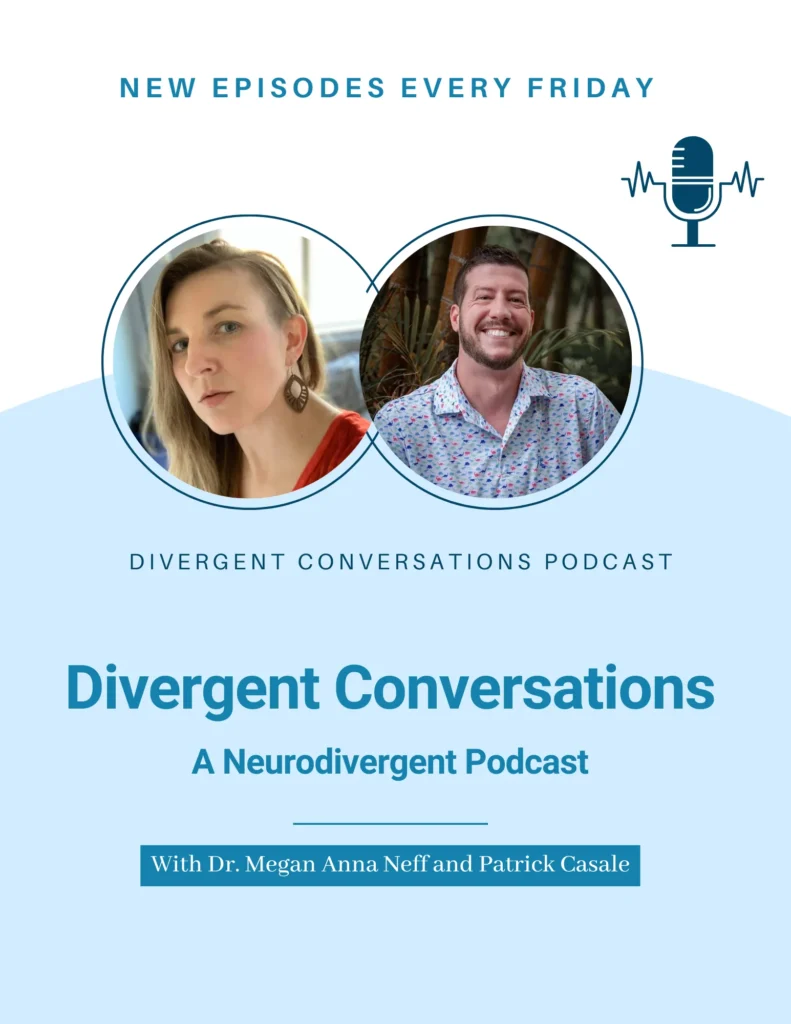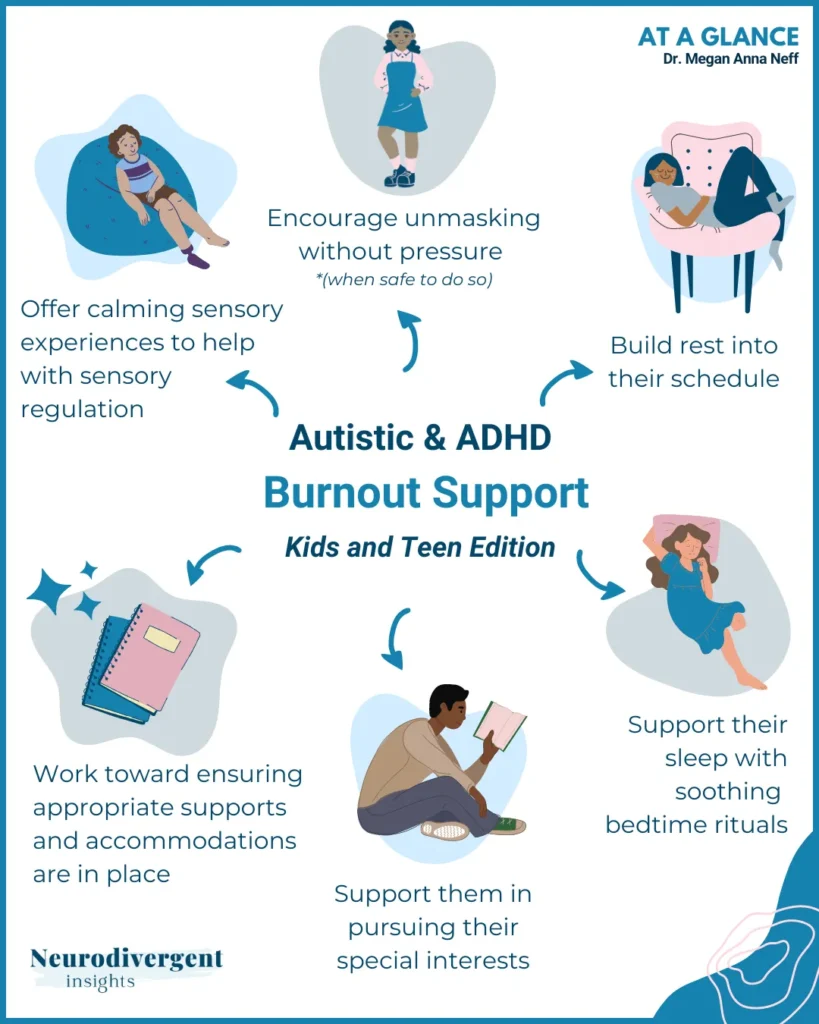
Supporting Autistic Kids and Teens Through Burnout
As many kids are getting back into the rhythms of in-person school, sports, and extracurricular activities, I’ve found myself thinking about how our neurodivergent children are adjusting. It’s a lot for their sensory systems to handle, especially after extended periods at home. Below are some ideas on how to support your neurodivergent children (many of these apply to both Autistic and ADHD children).
Here are a few of my suggestions on how to help your children prevent and recover from burnout.
Support Sensory Detox and Meltdown Recovery
After a long day of managing sensory overload and masking at school—where neurodivergent children often suppress their natural behaviors — it’s common for them to experience what’s known as After School Restraint Collapse. This can lead to meltdowns at home, but these meltdowns are actually a sign that your child feels safe enough to release all of the pent-up stress from the day.
While tough to navigate, it can be helpful to create supportive sensory detox rituals to ease the transition from school to home. Whether it’s a long, hot shower, quiet alone time, or engaging in a calming activity like video games or swinging, these sensory-based activities can help children decompress. Creating a predictable after-school ritual that includes sensory recovery time can make these transitions smoother and less overwhelming.
Encourage Unmasking and Strategic Social Withdrawal
In addition to supporting meltdown recovery, it’s helpful to encourage unmasking by being a safe person for your child to be themselves around — allowing neurodivergent children to express their authentic selves without suppressing their natural self-soothing behaviors or communication styles. Masking can be exhausting for Autistic and ADHD children and teens, and having a space where they feel free from the need to mask is essential for their emotional well-being and positive identity formation.
Unmasking doesn’t mean there are no boundaries, but it does mean creating an environment where they feel safe expressing their true selves. This also ties into strategic social withdrawal, where children may choose to step away from social situations as an adaptive way to recharge their energy. While this might sometimes be mistaken for withdrawal due to depression or anxiety, for many neurodivergent kids, it can be a healthy coping mechanism to prevent sensory overload and to replenish energy. That said, if you notice social withdrawal accompanied by other signs of distress, it’s important to monitor for underlying anxiety or depression.
Support Special Interest Projects
Getting absorbed in a special interest can help children enter a flow state, which is incredibly restorative for the brain. Many neurodivergent kids find that diving deep into their special interests not only helps them unwind but also regulates their emotions. Whether it’s building with Legos, drawing, or learning about a favorite topic, these activities provide an emotional reset. Helping your child engage in their special interests is a great way to support their emotional regulation and offer relief after a sensory-heavy day.
Getting into a “Flow state” is so restorative for the brain. Many of us get into a flow state by getting absorbed in our special interests or hyper-fixated on a project. This is a great way to unwind and detox after a long sensory day. Helping your kids get lost in a project they love soothing. Many Autistic and ADHD people often find their special interests or passions to be regulating. And so spending time in special interest projects can also help to regulate difficult emotions.
Support Their Sleep
Neurodivergent children tend to have more difficulties with sleep, especially in their younger years (ages 0–8). The transition to bedtime and alone time can feel overwhelming for many, so incorporating bedtime rituals, routines, and transitional objects (like a favorite blanket or stuffed animal) can provide comfort.
While there are mixed feelings about melatonin use and children. Some recent research demonstrated that melatonin can be a safe and effective tool for improving sleep in Autistic and ADHD children especially when paired with supportive sleep strategies. It can help with falling asleep faster and staying asleep longer. However, it’s important to use it safely, so be sure to consult with your pediatrician before starting. For children over five, a small dose — like these gummies—can easily be adjusted based on your child’s needs with your pediatrician’s guidance.
Having family cultural norms around technology (phones and iPads) being out of the room at bedtime also supports healthy sleep routines. This can contribute to a more restful environment and support healthy sleep habits. And remember—children often follow the examples set by adults, so modeling these routines can have a positive impact!
Cultivate Rest and Strategic Downtime
Our culture is fast-paced, and often, our kids’ lives are packed with activities. Neurodivergent kids need strategic downtime built into their day for proper sensory recovery. Rest is essential in preventing burnout, and sometimes this means rethinking how much we expect them to do. It’s important to allow your child time to rest, recharge, and recover, rather than packing their schedule with back-to-back activities.
Incorporate Soothing Sensory Activities
Sensory routines are essential for helping neurodivergent kids regulate their bodies. Some of my go to tools for this include therapy swings, bouncy toys, crash pads, bean bag chairs, and fidgets. These kinds of repetitive, rhythmic movements can be calming and help children feel more in control of their bodies after a long day of sensory input.
I often refer to these practices as a “sensory detox” after a day full of stimulation. Just like adults need time to unwind, neurodivergent kids benefit from predictable, soothing activities to reset their sensory systems.
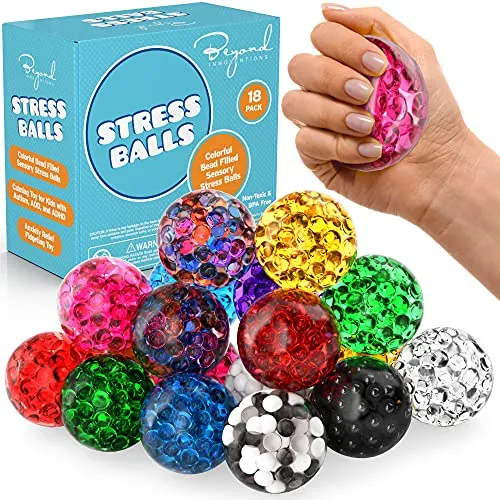
Holistic Health Considerations
Burnout in neurodivergent kids can often be compounded by underlying health issues. Research shows that neurodivergent children are more likely to experience medical conditions like chronic fatigue or gastrointestinal problems, which can intensify their exhaustion. For example, a recent study found that neurodivergent children were twice as likely to experience chronic disabling fatigue by age 18. If your child seems unusually fatigued, it’s worth exploring potential co-occurring health conditions that may be contributing to their burnout. Consulting a pediatrician or specialist can help identify and address any underlying issues.
Puberty and Burnout
Puberty can be an especially intense time for neurodivergent kids. Hormonal changes can make them feel emotionally and physically overwhelmed, much like during their toddler years. For ADHDers and Autists, this phase of life can feel like navigating a storm, especially if gender dysphoria is also present—something more common among neurodivergent individuals.
Consider reducing unnecessary demands during this time and ensuring school accommodations are adjusted as needed. Providing flexibility and understanding during puberty can help teens feel more supported as they navigate these changes.
Ensure Support and Accommodations Are in Place
One of the biggest causes of burnout is when the demands on a child’s time and energy exceed their internal resources and available supports. Taking steps to ensure that your child has the appropriate accommodations in place at school or in other environments. This is especially important for twice-exceptional children, who might excel academically but still require support in other areas. In these cases, parents often need to advocate extra hard to make sure those supports are accessible.
Help Kids Understand Their Energy: Energy Accounting and Spoon Theory
I’m a big believer in teaching kids about Energy Accounting and Spoon Theory. These are practical frameworks that help children and teens understand how to manage their energy and avoid burnout. By thinking of energy as a resource to be spent wisely, neurodivergent kids can learn how to balance their activities and make room for sensory recovery.
I’ve developed some fillable worksheets and workbooks, such as Energy Accounting worksheets and a Spoon Theory workbook that parents can use with teens to help them visualize their energy inputs and outputs.
Burnout recovery is a journey, but with the right tools and understanding, we can support our neurodivergent children as they navigate these challenging experiences.
For more information on autistic burnout and the risks associated with it, check out this article about spotting the signs of Autistic burnout and this article about building an Autistic burnout recovery plan.
References
Neville, F., Sedgewick, F., McClean, S., White, J., & Bray, I. (2024). Reacting, retreating, regulating, and reconnecting: How autistic adults in the United Kingdom use time alone for well-being. Autism in Adulthood. Advance online publication.
Parvataneni, T., Srinivas, S., Shah, K., & Patel, R. S. (2020). Perspective on Melatonin Use for Sleep Problems in Autism and Attention-Deficit Hyperactivity Disorder: A Systematic Review of Randomized Clinical Trials. Cureus, 12(5), e8335.
Raymaker, D. M., Teo, A. R., Steckler, N. A., Lentz, B., Scharer, M., Delos Santos, A., … & Nicolaidis, C. (2020). “Having all of your internal resources exhausted beyond measure and being left with no clean-up crew”: defining autistic burnout. Autism in Adulthood.
Raymaker, D. M., Teo, A. R., Steckler, N. A., Lentz, B., Scharer, M., Delos Santos, A., Kapp, S. K., Hunter, M., Joyce, A., & Nicolaidis, C. (2020). “Having all of your internal resources exhausted beyond measure and being left with no clean-up crew”: Defining autistic burnout. Autism in Adulthood, 2(2), 132-143.
Quadt, L., Csecs, J., Bond, R., Harrison, N. A., Critchley, H. D., Davies, K. A., & Eccles, J. (2024). Childhood neurodivergent traits, inflammation, and chronic disabling fatigue in adolescence: A longitudinal case–control study. BMJ Open, 14(7), e084203.
